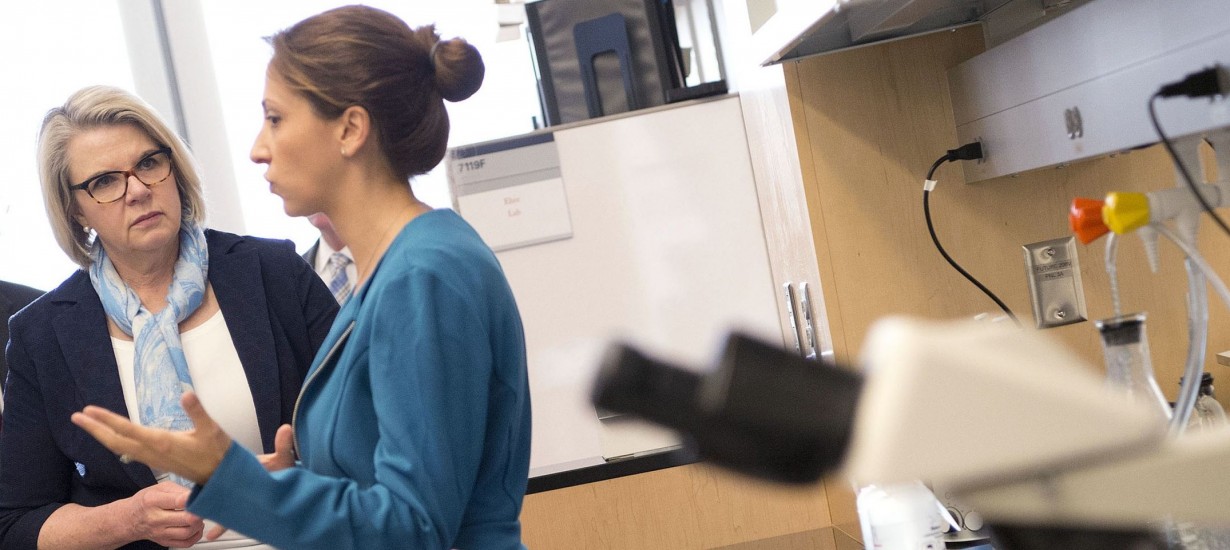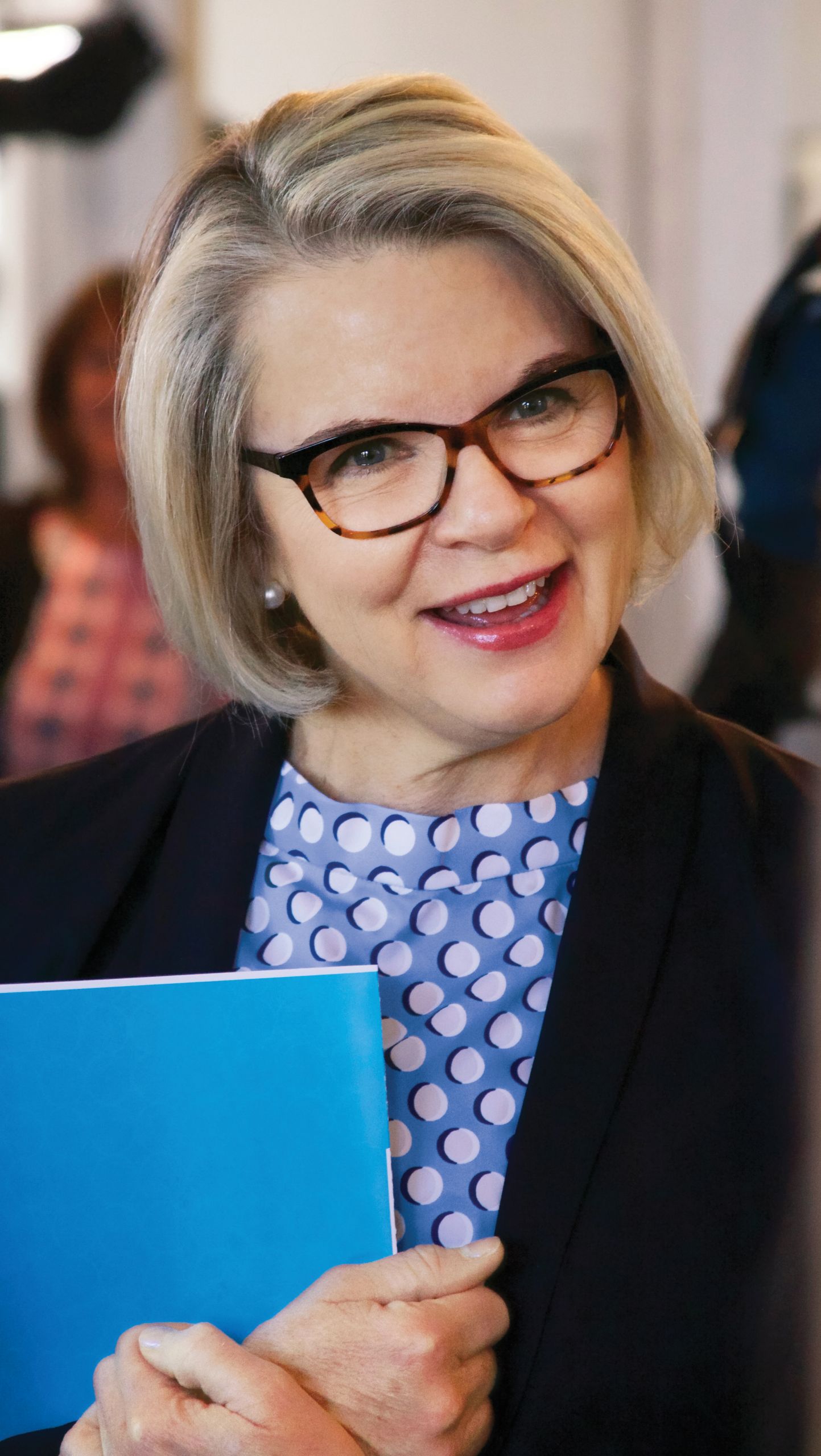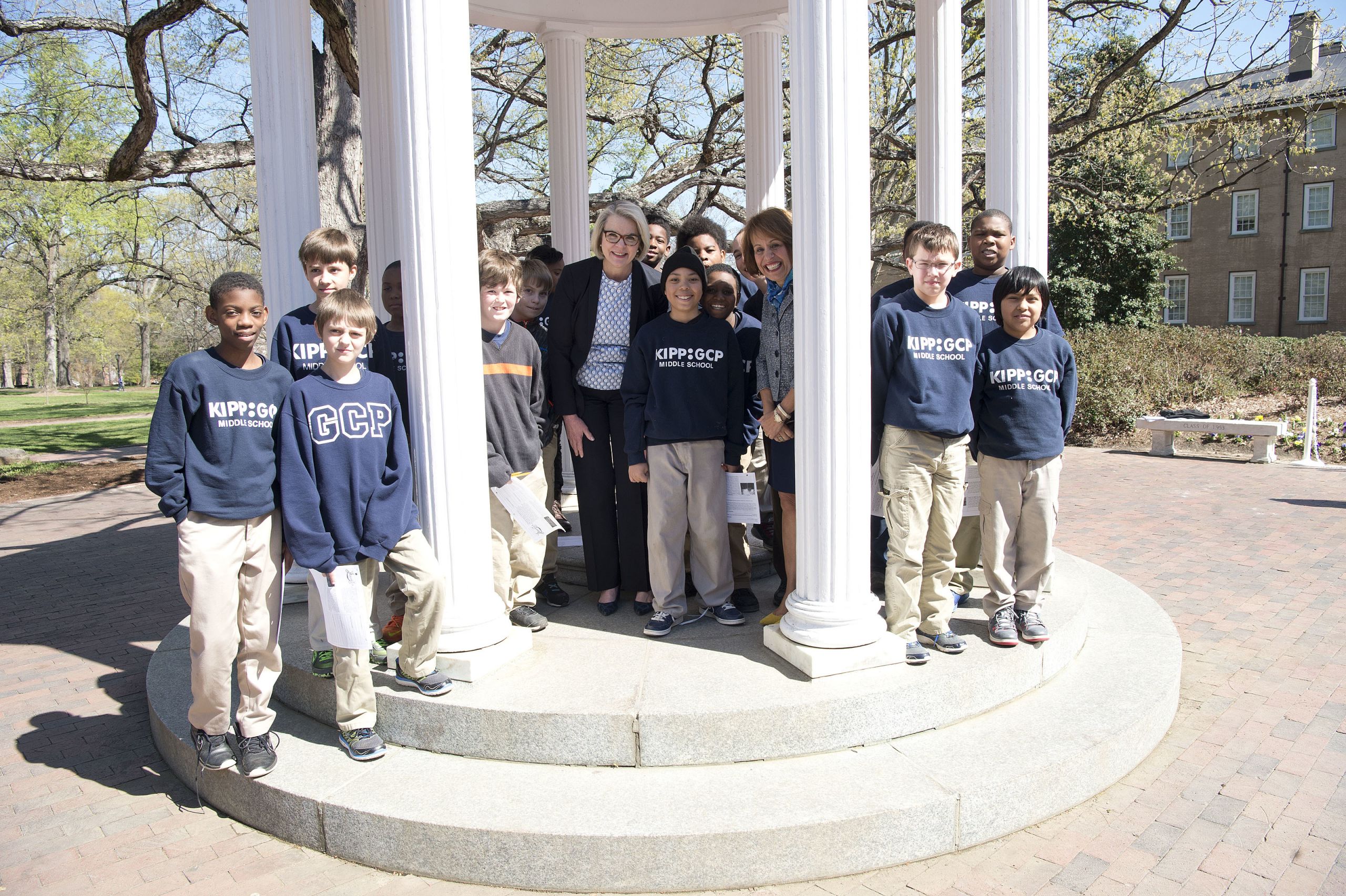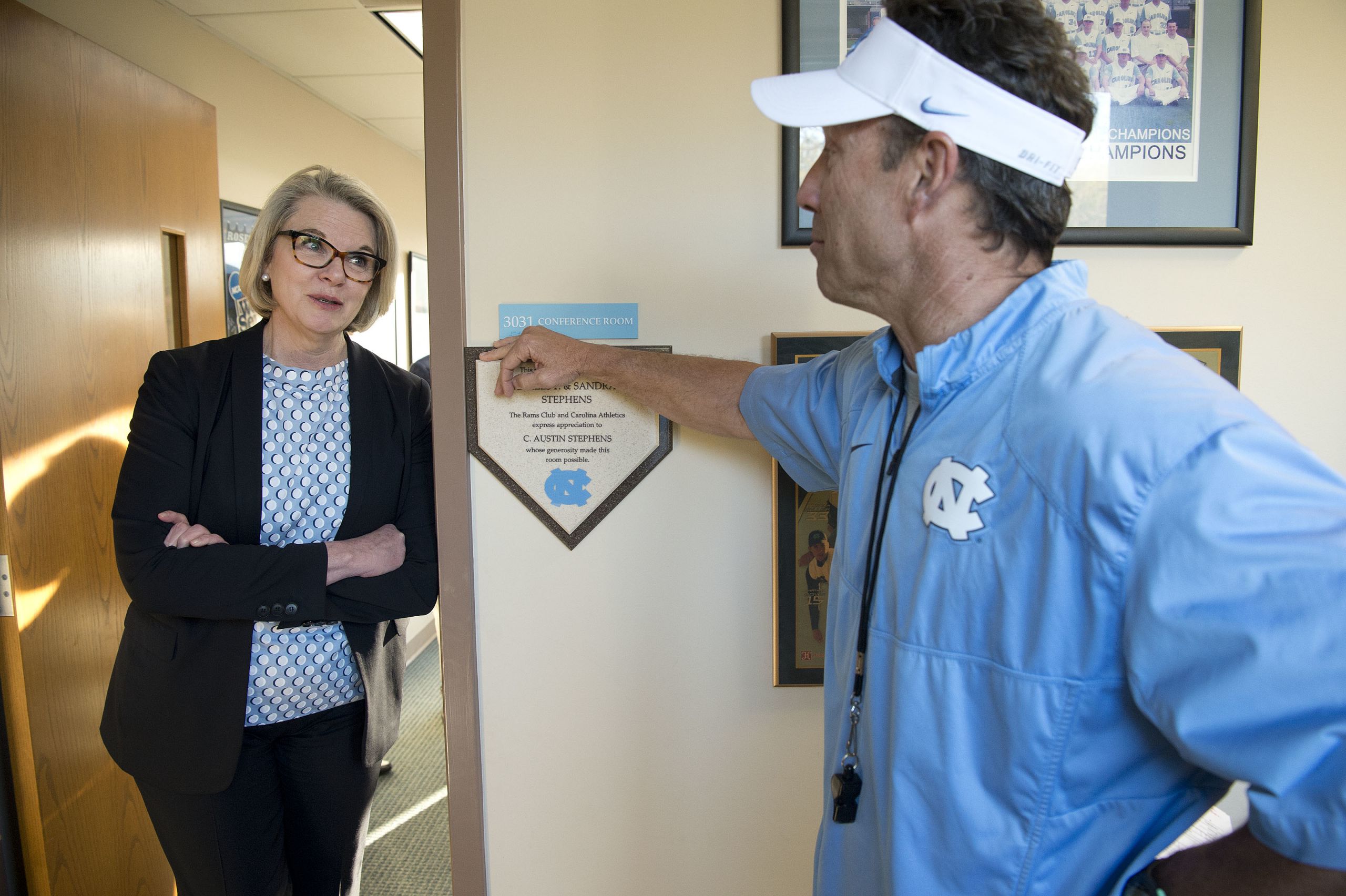A Test of Leadership: Margaret Spellings Takes UNC System’s Helm

by David E. Brown ’75
She has a reputation for toughness, and thick skin already has come in handy. She took a very big job that she did not seek but which appealed to her immediately. She stepped into an atmosphere pre-poisoned by her most critical constituency — students and teachers — but at the same time politically friendly in terms of the leadership of the UNC System that stretches from Raleigh to the foot of Chapel Hill, people who did not care for her predecessor from the other side of the aisle.
Margaret Spellings, who on March 1 became the sixth president of the consolidated UNC System, has spent more than three decades in education and public policy work and has done so at the highest levels. She comes from the Public Education Committee of the Texas House of Representatives, the leadership of that state’s school boards, the right hand of then-Gov. George W. Bush. After Bush became president, she advised him for four years on issues including AIDS relief and immigration, and she served five as his secretary of education.
Spellings convened the landmark Commission on the Future of Higher Education in 2005, and she led the implementation of Bush’s No Child Left Behind accountability initiative for U.S. public schools.

Spellings speaks to the media during her tour of Carolina . (UNC photo by Jon Gardiner ’98)
Probably owing as much as anything to the clumsy rancor that surrounded the system Board of Governors’ dismissal of Thomas Ross ’75 (JD) after his fourth year as president, Spellings’ resolve was tested before the first day of class.
The Faculty Assembly, which represents teachers on the system’s 16 universities, was apoplectic over being left out of the search process even though there is no precedent for its being included.
The assembly finally stated: “The faculty will not prejudge the commitment of the new President to the well-being of the University. But she must understand that the secretive character of this search, and her own indifference to consulting with staff and faculty when she was an active candidate for the position, will make it difficult to win the confidence and trust of the University community.”
In her first meeting with reporters last fall, Spellings, who once decried the airing of a PBS children’s show that portrayed gay parents, responded to a question about the homosexual-bisexual-transgender community by saying she had “no comments about those lifestyles.” Months later, as she started work, she was represented by a message she emailed to the campus community in which she pledged to visit every campus in the system in the ensuing weeks.
“The scholarship and innovation coming from our universities has lifted the quality of life for people the world over,” she wrote. “We can and should sustain that quest for excellence. But in today’s world, education is the new civil right. Our public universities have an economic and a civic imperative to help many more people — particularly people of color and those from first-generation and low-income families — achieve at much higher levels.
“Achieving this goal begins with ensuring that our campuses are welcoming and safe places for students and faculty of all races, religions, ethnicities, sexual orientations, and gender identities to live and learn and work alongside one another.”
The remarks were similar to those she had made at a recent BOG retreat, where she said she had been surprised by the level of criticism that preceded her opening day.
Part of that criticism came from the Chapel Hill campus, where the displeasure of some students climaxed in a rally on Spellings’ first day of work that attracted some 400 people unhappy with what they perceived as her views on LGBTQ issues, for-profit universities and the student as “customer.” Decorum was a second-class guest at this and protests on other campuses.
The Carolina Di-Phi Societies debated Spellings’ appointment and voted 25-12 for her resignation, with 11 abstaining. The national media chimed in: Inside Higher Education condemned the Future of Higher Education report, “A Test of Leadership,” for its emphasis on the commercial value of a college education, saying, “There is nothing in the report that recognizes the need for basic noncommercial research in the arts and sciences, or that states why intellectual inquiry is good on its own terms.”
Ross came to her defense, writing, “It is unfair to blame her for what happened to me or for the process that selected her.”
And former Gov. Jim Hunt ’64 (LLBJD), who served with Spellings on Future of Higher Education, said her critics “haven’t seen the Margaret Spellings I have seen. She cares about people, all people. She is determined, and her passion is education. She’s a person of strong will and great energy.”
Before taking office, Spellings asked for a $1.1 million, privately funded study by the management firm Boston Consulting Group to study the UNC System’s administrative operation. The report was posted at www.northcarolina.edu in late March.
She repeatedly has emphasized access and affordability, and she told members of the BOG at a retreat: “We’ve not done this well in the past, and we continue to fall short now.”
Spellings was the first candidate the BOG search committee interviewed. Her base salary is $775,000, plus benefits, and she’s moved into the 110-year-old president’s house on East Franklin Street. On a break from a tour of all 17 UNC System campuses in mid-March, she spoke with the Review.
Q&A

“I wouldn’t have come here if I didn’t really believe that we have every prospect of leading the country as the most affordable system of higher education and the strongest value proposition for our students.” (Photo by Mike Benson)
Review: The people who hired you considered you a terrific catch for the presidency of this system. Why do you think they were right?
Spellings: I wasn’t seeking this opportunity particularly, but I’ve long admired this place in every sense. … So I hope they are as excited as I am. I think they made the right choice because they’re looking for someone that can be a bridge builder between — and maybe there’s not much of a distance between the two things — but between the academy and policymakers, legislators and the public. That’s maybe a three-way bridge. I have a lot of experience in the political arena and the public-policy arena, working across both sides of the aisle, at the state level, at the federal level, on behalf of local governments, specifically school boards. I’ve done it for a good while. I’m an expert in higher education, but I also know how to manage in a political and policy setting.
Review: Given all you have done in a long career, from a personal perspective, why was this job the thing you wanted to add to it?
Spellings: I have had a great experience serving in a big, big management role in the highest levels of our government and all of that, and I thought I was kind of going into that final chapter, too — but I’m 58, and I thought, ‘Well, I can do one more really big rodeo. My children are grown; I am single; I have the good health and the opportunity … to go full out on something in my career.’ And again, this is an unbelievable place, an unbelievable institution, and it sounded to me like a great way to try to add value and put all my various experiences to work.
Review: You have to have studied the system pretty thoroughly. What did you find that surprised you?
Spellings: As a system, I think this is an unusual government structure, and I don’t mean that in any kind of pejorative way about what’s going on now or what went on 10 years ago. It is unusual to have 17 institutions knitted together under a 32-member governing board appointed by a legislature, with boards of trustees that are largely advisory, that have equities and decisions as well in an environment that is characterized by shared governance with the faculty. So there are some pluses and minuses about that. The good news is you have a lot of people who own the institution and who have a say in the governance of the institution. The flip of that is, you know, you got a lot of cooks in the kitchen. I knew I was going to a place where this is considered the gem of the state and every citizen of this state has an incredible pride in the system — that’s absolutely palpable when you get to the ground and understand the uniqueness of each of these institutions and how they’re so different and so valuable.
Review: The people you’re visiting on the campuses cannot help but have seen that there was a fair amount of protest and turmoil that greeted your coming. What are you telling them to convince them that the protesters were wrong?
Spellings: I’m asking them — not telling them — I’m asking them to give me a chance. At each of these places I’ve asked to meet with faculty leaders, students, boards of trustees, community leaders, obviously the chancellor and his or her cabinet and senior team, so I think I’m seeing the right people everywhere I go. And we’ve had very candid conversations. I’m asking them to give me a chance, and I think my thesis is that we have a whole lot more in common than we do different. The protesters and the people who have objected are not necessarily the people that I’m talking to. I don’t expect them to be cheerleaders, but most of the people in this system are here to do their own job and their own work, and they want me to be successful. They hope that I’ll be wildly successful with the Legislature. So I’m hearing 99.999 percent that.
Review: A couple of years ago, Gov. Pat McCrory sort of set the tone for a discussion about the value of a liberal arts education when he made it clear he wanted to see more direct results in terms of jobs. Talk about an education for the benefits of discovery and critical thinking versus education targeted specifically at the economy.
Spellings: This thing gets set up as kind of a binary either-or — either we’re fans and supporters of the liberal arts or we provide opportunity for people to have successful careers and jobs, and I think they are absolutely mutually enforcing and integrated. I myself have a political science degree, and my two daughters went to small liberal arts colleges, so I’m a big believer in the liberal arts. But I do think most taxpayers and citizens — I certainly feel this way as a parent — want their children to have a j-o-b. We know the liberal arts teach people how to write and think and cipher and have those higher-order thinking skills, and certainly hope that’s the case in job training as well, but it’s not a binary either-or argument. I just think that’s false.
Review: Does a campus like Chapel Hill need to change in this regard?
Spellings: Well, some places it’s supposed to be tilted in that direction because that’s their mission. That’s what is so fascinating and fun about this institution. We have a school for the arts; we have the liberal arts schools; we have places that are leaders in science and technology; we have HBCUs and so forth. So yes, some are tilted toward the liberal arts — that’s what they’re supposed to be, and some are tilted toward workforce training.
Review: There is some talk about some schools in the system that aren’t performing as well as those running the system would like — specifically some of the historically black universities. Obviously it’s going to be very controversial to talk about major changes. How do you think is best to address that, and is there some middle ground on some underperforming schools, such as possibly combining programs with others in their regions?

Spellings and UNC Chancellor Carol L. Folt posed at the Old Well with a group of school students who were visiting campus. (UNC photo by Jon Gardiner ’98)
Spellings: This is where accountability and performance data and understanding the unique mission really all collide. [Some of the schools that are underperforming] often have much harder work to do. They’re taking first-generation students who have often had less than stellar experiences and opportunities in their K-12 schools; they’re in systems that have sometimes been under-resourced, et cetera, et cetera. Their charge was doing some of the hardest work in American higher education. So what I think we need to do is say, ‘Where are they now? Where are they going? What is their unique role?’ Far different from Chapel Hill, where there are multitudes of brainiacs who are going to be the world’s leaders and innovators and so on. It’s just a different assignment.
Review: Is there a possibility of combining some programs between schools that are geographically close?
Spellings: Of course, that’s the Legislature’s prerogative. Again, I think part of my job is to tell the story of what’s happening in these places and what they’re being asked to do. We can be very clear with the Legislature. We must be more clear with providing data about the value proposition of HBCUs, and Chapel Hill, and everybody else: What are we supposed to do, how well are we doing it and what’s the evidence? That’s what I’m going to be asking.
Review: You have talked about the imperative to help more students get access — especially students of color and those whose families don’t have a college background. What are the most important challenges to fuller access, and what solutions do you have in mind?
Spellings: The first thing we need to do to knock it out of the park on access is make sure that we have students who come out of our K-12 schools ready, willing and able to do college work. And our part in that with 15 teacher preparation programs is to make sure we are sending a teacher corps that can meet that challenge. That’s going to be a priority for me. I’m going to be asking, ‘Are we using evidence-based practices? How are we holding ourselves accountable for the performance of the teachers who are coming from our prep institutions? How well do they do when they get in our schools?’ Et cetera.
So that’s part of access — making sure the kids are ready to do college-level work. The other thing, of course, is money and affordability, and making sure we have systems that are priced in ways that are accessible to students. As you know, the Legislature is considering … some differentiated pricing at institutions that have capacity and that are serving very disadvantaged populations.
Review: You mentioned K-12, and we have a situation now in which enrollment is dropping at the education schools. What kinds of things can you in the higher education position do to influence what’s being done to get college students interested in studying teaching?
Spellings: My hope is — whether we’ll be successful or not — is that we have to elevate the issue and we have to elevate the profession and we have to elevate the value of the profession. It’s penny wise and pound foolish for us to underinvest in teaching and then have to basically try to compensate for a lack of skill in numeracy and literacy at the college level. It’s a lot more expensive at Chapel Hill to teach kids how to read and cipher than it is at their local high school. So I think elevating the issue of teacher prep and making sure they have the best tools and skills available to be as effective as possible I hope will raise the whole ethic around teaching, with the Legislature and with the public generally.
Review: Chapel Hill has for several years met what it calls 100 percent of need — everybody who qualifies for financial aid is getting grants or loans that cover the cost, and the University stays far below the national level of post-graduated debt. This has become a struggle to continue to fund, and the people at UNC wonder how they can keep that commitment.
Spellings: It’s part of the constitution that our responsibility in the system generally is for a system that is free as far as practicable. And I think it’s the “as far as practicable” stuff that we’re all challenged with, whether you’re in the Legislature or whether you’re a chancellor trying to make the ends meet. So you bet it’s a goal. How we get there — I think this board eventually would like to understand, ‘Do we have a funding model generally? If we had a blank sheet of paper, and we were going to figure out how we were going to fund higher education in North Carolina, what would it look like? Would we do a per capita method?’ It’s ripe for consideration. But that’s the mother lode of policy work.
Review: What do you think about the status of faculty tenure today? Is the status of tenure going to become a significant issue?
Spellings: Just the economics of higher education today have netted out some behaviors, like a lot of reliance on adjuncts, that has been brought to bear by the academy itself. The way I look at this really is not about should we have tenure or shouldn’t we have tenure. It is about the student at the center of this, which is, ‘How do we provide an affordable, high quality value proposition for students as individuals and for ourselves as a state and as a country?’ Tenure is a strategy around that objective. How it’s used and to what extent, I think we have to turn the pancake over and start with the students. I think we need to step back and think about what are the results that we want. The result we want is students who are wildly capable — and how are we going to get that? Well, we have to have faculty that is very capable, wildly innovative, well-enough compensated. But tenure, no tenure — I think that’s a red herring of an issue. It’s off point.
Review: The entry of for-profits in higher education still is a relatively new notion to a lot of people. You’ve got some experience in this area. How well do you think that is working in general, and what do you think that model has that could be adopted or modified for use in this system?
Spellings: John Sperling, who was the founder of the University of Phoenix, basically invented an industry which is providing education that’s convenient and for working adults. And the whole model is basically an a la carte system, where you take a course at a time over about a six-week period in a blended way, much of which is online, obviously. The industry is 30 years old. That was wildly innovative. Traditional higher education has started to use some of those same sorts of techniques to educate students, and so there’s more competition in the education landscape. The University of Phoenix and Strayer and others often are serving a different kind of student than you would find at Chapel Hill. These are working adults, often first generation, people who are trying to get a skill or a certification to go immediately into a particular type of workplace. It’s just a different kind of enterprise. We’re not in competition with each other. There’s plenty of work for everybody. But I do think there’s some lessons to be learned from the tech-based companies that have been successful that we’ve applied and are applying in traditional higher education.
Review: Anything specific?
Spellings: To me the secret sauce there is 24/7 availability and convenience. The other thing that’s specific that is happening there that is starting to happen more in traditional higher education are these notions of badging and credential-based systems, so that this idea that we’re going to show up as freshmen on day one and matriculate four years later in the same place — that’s really kind of a vestige of the past. We’re all going to have kind of an a la carte portfolio-based system of badges that are gathered from online providers, physical plants, for-profit, nonprofit, employer provided, et cetera, through our lifetimes.

Spellings chats with Tar Heels football coach Larry Fedora during her campus visit. (UNC photo by Jon Gardiner ’98)
Review: In athletics, we’ve had some problems in Chapel Hill. How much, in your various roles in the past, have you come into contact with intercollegiate athletics?
Spellings: Almost none.
Review: Chapel Hill has put a lot of reforms in place, but two key things have not changed — special admissions for athletes and time devoted to sports are essentially the same. Do those very fundamental things need to change?
Spellings: When I say we need to look at the whole funding model, I think that’s part of it. Is it really true that these things are completely self-sustaining as business enterprises without state or federal funds? I don’t have any preconceived notions about that, but I do think it’s a big part of the equation — is the tail wagging the dog? I don’t know. We’ve got to look at the numbers; we’ve got to look at the math. There’s much to be recommended about it — it’s how we often engage students and communities, it’s what builds common cause in a place.
Review: Also, the issue of whether universities are being fair to the students they bring in to play the games — are they educating them?
Spellings: I don’t know where we are yet. I came from an institution that was sited on the SMU campus, and as you know they have a storied past it’s taken them 25 years to overcome. You only get one shot at retaining your brand, and you have to work at it every day. It’s a complicated and interesting policy problem [that] I think we ought to look more into. But my understanding here is obviously these are mostly things that are governed at the campus level.
Review: When you get a chance to dream about big initiatives, for which we’ll say you would have the resources, what kinds of things do you think about being able to do for this system?
Spellings: I wouldn’t have come here if I didn’t really believe that we have every prospect of leading the country as the most affordable system of higher education and the strongest value proposition for our students. We start from a great base — it’s one of the most affordable and it’s one of the finest systems in the country. If we harness the mighty engine, I’m confident that we can be successful. And those are things that we can measure. That’s not pie in the sky. Five years from now, I’ll either be sitting here saying we made it, or we didn’t.
David E. Brown ’75 is senior associate editor of the Review.
ONLINE: Spellings’ first Board of Governors meeting after taking office is on YouTube.
Thanks for reading the Carolina Alumni Review
Carolina Alumni members, sign in to continue reading.
Not yet a member? Become one today.
